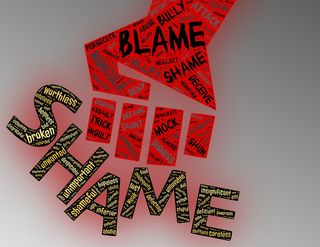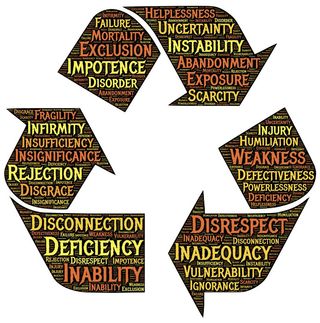Sex
Overcoming Religious Sexual Shame
An epidemic of sexual shame is crippling people taught to be "pure."
Posted August 23, 2017 Reviewed by Jessica Schrader

An entire generation of people are encountering crippling sexual shame and pain as they wrestle with their sexual desires and interests, in a world for which they were unprepared. For decades, sexual education in the United States and elsewhere has been shaped and influenced by moral and religious forces. Abstinence-only education, where students are taught that abstinence, and choosing not to be sexual, is the best, safest option is only one aspect. Abstinence-only sexual education has been largely discredited and shown to have the potential to actually increase problems and risk of engaging in sex without condoms or preparation.
Ostensibly, abstinence-based sexual education was rooted in the secular approach that choosing not to be sexual outside of a committed, monogamous, adult relationship was the best protection from exposure to sexually-transmitted infections and/or unplanned pregnancy. But, along with abstinence-only education came the concept of “purity,” and the morally-based belief that remaining pure from sexuality until marriage was a good, moral and desired choice. The purity movement infused sexual education with a notion that our sexual urges are immoral, and that we are better people when we choose to live above them. The purity movement focused heavily on female sexuality, with father-daughter dances and pledges of remaining virginal until marriage, along with school dress codes that focused on covering up female students, to prevent males from becoming overly aroused. Unfortunately, the vagueness and broadness of the sexual constrictions in the purity movement left people confused, and often feeling that they must reject even normal, healthy sexual urges. Sadly, only sexual urges within heterosexual, committed, adult relationships were defined as healthy. This leaves out a lot, and also abandons teens to be unable to learn or understand their own sexual urges, with the notion that they will understand them once they’re married.
Across the country, therapists are now seeing a tide of young people, feeling immense shame and pain about their sexual urges, desires and behaviors, as these young people encounter the wide world of sexuality available outside the confines of these moral fantasies. The youth can use their smartphones to see all the sex they want, or they enter college, where they find that their newfound freedom is exhilarating and intimidating. One young man I saw a few years ago was an 18-year-old college student, deeply afraid that he was addicted to masturbation. He was only masturbating once a week, but because he’d grown up in a family where any sex outside monogamous marriage was sinful and condemned, his quite normal sexual behavior was experienced with deep shame and fear.
Tina Schermer Sellers is a Seattle-based marriage and family therapist and sex therapist who has been seeing these purity-movement victims for several years now, and has encountered countless individuals and couples who feel lost and alienated from their sexuality, caught between their desire to be good Christians, and their all-too-human physical needs and reactions. She explores the provocative proposal that the purity movement has actually resulted in sexual trauma, by using shame as a weapon to make young people hate and fear their own bodies and needs. Her new book explores her own journey as a therapist through the narratives of the people who came to her for help:
“Sex was a silent, loaded topic in my family while I was growing up.”
“Sex is for marriage and that’s all you need to know.”
“I feel like the church instilled in her [his wife] to be deeply suspicious of me and their sexual drives. Now, that same suspicion is in bed with us every night. I hate it, and I wish we could just enjoy having sex without all the suspicion about who’s thinking what.”
Schermer Sellers explores the origins of sexual shame in Christianity, grounding much of it in early religious acceptance of the mind-body split. The mind/body split is the notion that our souls and our bodies are two different things, and that our bodies are mired in the evils of the physical world, while our souls can, and should transcend our base desires. This root rejection of our physical experiences, and the perception of sexuality as the most tempting, corrupting aspect of our physical lives, led to millennia of sexual shame, where sexuality is portrayed as a weakness. Those who abstain, who take vows of chastity, are seen as most pure. Sadly, that leaves all the rest of us as tainted.

Sexual shame is not solely a religious issue, but it is in the religious communities where we are now seeing this problem reach epidemic levels. Atheists who watch porn rarely report concerns or problems with it, while the strength of a person’s religious beliefs and moral condemnation of porn, predicts that they will feel addicted to porn, regardless of how little they watch. Religious people are at heightened risk of developing sexual disorders and feeling at a loss to deal with them or get help. Sadly, when people within religious communities seek help for their sexual concerns, they are most often told to suppress or “battle” their sexuality, or sent to pseudotreatments such as sex or porn addiction programs, where their sexual desires are portrayed as a form of sickness. Shame creates a feedback loop of pain, fear, dysfunction, and self-hatred, which is the true root of most sexual problems.

"Sexual shame is a visceral feeling of humiliation and disgust toward one’s own body and identity as a sexual being, and a belief of being abnormal, inferior and unworthy. This feeling can be internalized but also manifests in interpersonal relationships having a negative impact on trust, communication, and physical and emotional intimacy. Sexual shame develops across the lifespan in interactions with interpersonal relationships, one’s culture and society, and subsequent critical self-appraisal (a continuous feedback loop). There is also a fear and uncertainty related to one’s power or right to make decisions, including safety decisions, related to sexual encounters, along with an internalized judgement toward one’s own sexual desire."
From the dissertation work of Dr. Noel Clark at Seattle Pacific University, 2017
People can overcome sexual shame in their lives without abandoning their religious values and beliefs. In her book, and in this interview, Dr. Schermer Sellers explores ways in which she has helped people explore the notions of sacred and positive sexuality, which exist in ancient Jewish and Christian teachings. She, and others, such as the Religious Institute, are identifying the core need to help religious people develop a new sexual ethic, one that they choose and develop as adults, which focuses on intentionality, authenticity, consent, honesty, and mutuality.

We can help people struggling with sexual shame to overcome it, by not rejecting themselves, but instead, by deciding who and how they want to be sexual, from a place of information rather than ignorance. Offering sexual education about the range of human sexuality, and educating about sexual diversity, and the church’s struggles with sexuality in the world, are a way to empower people to begin making their own decisions about how to integrate their sexual selves, with their spiritual selves. It is only when a person accepts their sexuality as an aspect of themselves, and not something that is external to them, that a person can truly begin to heal from sexual shame. Then, and only then, can they evaluate their sexuality from a position that supports their own health, in a way that promotes healthy sexual values, in their lives, relationships, and even their soul.




